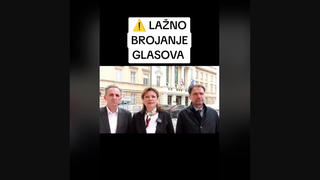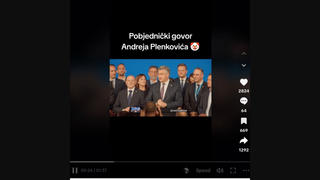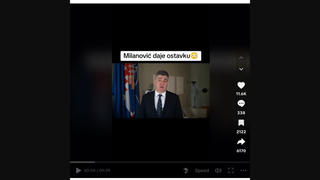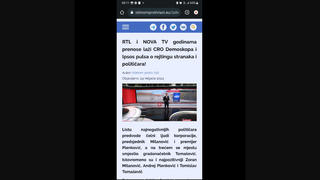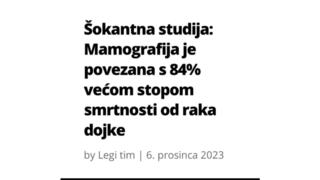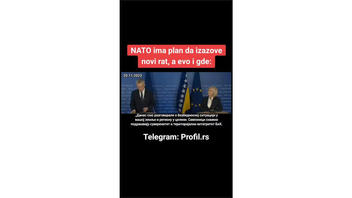
Does a video prove that NATO is planning on starting a war in Bosnia and Herzegovina? No, that's not true: The video is from the joint press conference by NATO Secretary-General Jens Stoltenberg held in Sarajevo, on November 20, 2023. In the press conference, the Secretary-General stated that NATO has committed to Bosnia-Herzegovina for many years, and that they are deepening their cooperation and political dialogue, as well as their practical cooperation. He mentioned his concerns about the secessionist and divisive rhetoric, as well as malign foreign interference. Nowhere in his speech did he indicate that NATO is provoking a war in the country. On the contrary, he emphasized NATO's support for the sovereignty and territorial integrity of Bosnia and Herzegovina and condemned foreign attempts to divide the country.
The claim appeared in a TikTok video (archived here) on November 21, 2023. It opened (translated to English from Serbian by Lead Stories staff):
NATO has a plan to start a new war, and here is where:
This is what the post looked like on TikTok at the time of writing:
(Source: TikTok screenshot taken on Sun Nov 26 09:18:37 2023 UTC)
The TikTok video refers to a speech from the joint press conference by NATO Secretary-General Jens Stoltenberg with the Chairwoman of the Council of Ministers of Bosnia and Herzegovina, Borjana Krišto in Sarajevo, November 20, 2023. The conference in its entirety is here (archived here). Secretary-General Stoltenberg expressed his concern about foreign interference from Russia. Russia is openly supporting Milorad Dodik, the president of the Republika Srpska entity in Bosnia and Herzegovina. By Dodik advocating for Republika Srpska to pull out, it could lead to the disintegration of Bosnia and Herzegovina or even possibly the unification of Republika Srpska and the Republic of Serbia. In his speech, Stoltenberg did not say that NATO is planning to start a war in that area but stated NATO's concern about the secessionist and divisive rhetoric, potentially threatening the territorial integrity of Bosnia and Herzegovina.
Bosnia and Herzegovina declared independence on March 3, 1992, after the independence referendum on February 29 and March 1, 1992, in which 99.7 percent voted for independence. Following the declaration of independence Bosnian Serbs mobilized in different parts of the country, under the army of Republika Srpska, a breakaway state formed in 1992, after Bosnia and Herzegovina proclaimed independence from Yugoslavia. Their army succeeded in placing much of the country under its control. The attacks were followed by ethnic cleansing of Bosniaks and Bosnian Croats in the Army of Republika Srpska-controlled territories. It culminated in Srebrenica in July 1995, when more than 8,000 civilians were killed. It was ruled to have been a genocide by the International Criminal Tribune for the former Yugoslavia.
NATO, together with the United Nations Protection Force carried out Operation Deliberate Force, a special operation intended to undermine the military capacity of the Army of Republika Srpska as a response to the difficult situation in Bosnia. It was carried out between August 30 and September 20, 1995. The war formally ended after the signing of the Dayton Agreement on December 14, 1995. The agreement was signed by Alija Izetbegović, the president of the former Yugoslavian Republic of Bosnia and Herzegovina, Franjo Tuđman, president of the Republic of Croatia, and Slobodan Milošević, president of the Republic of Serbia. The parties agreed to peace and a single sovereign state, Bosnia and Herzegovina.



